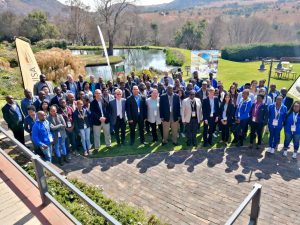Date: 09/30/2019
Writer: Tiffany Acosta, 575-646-3929, tfrank@nmsu.edu
 |
| Attendees from around the globe gathered in Muldersdrift, Johannesburg, South Africa, for the U.S.-Africa Forum on Nanotechnology Convergence for Sustainable Energy, Water and Environment in August. Abdessattar Abdelkefi, New Mexico State University assistant professor in the Department of Mechanical and Aerospace Engineering, helped organize the forum. (Courtesy photo) SEP19 |
LAS CRUCES – Before the fall 2019 semester at New Mexico State University began, Abdessattar Abdelkefi, assistant professor in the Department of Mechanical and Aerospace Engineering, traveled almost 10,000 miles to discuss solutions to global challenges with students and researchers at the U.S.-Africa Forum on Nanotechnology Convergence for Sustainable Energy, Water and Environment.
The forum, which Abdelkefi organized with Mamadou Diallo, director of molecular environmental technology of the Materials and Process Simulation Center at the California Institute of Technology, was funded with a nearly $100,000 grant from the National Science Foundation. Abdelkefi, who was principal investigator, and Diallo, the co-PI, were among 17 faculty members, graduate students, NSF and World Bank representatives from the U.S. who participated in the forum in August in Johannesburg, South Africa.
“It is most important to note that this forum gave a chance to students and researchers from different sides of the world to come together to discuss problems that they want to solve together,” Abdelkefi said.
“Studying nanotechnology, nanostructure and nanomaterials is something that is really complex,” he said. “It takes a lot of people, resources and time to fully understand what is occurring at the nanoscale. When the problems are solved, the applications of nanotechnology grow. Nanotechnology has the chance to really transform and improve existing systems, structures and more.”
Abdelkefi said one of the motivations for the forum was to address issues for the sub-Saharan Africa region, where the largest share of the world’s poor lives. An estimated 25 percent of the world’s population by 2050 will live in Africa.
 |
| From left, Abdessattar Abdelkefi, New Mexico State University assistant professor in the Department of Mechanical and Aerospace Engineering, Lueta De Kock, from the University of South Africa, and Mamadou Diallo, from the California Institute of Technology, were co-chairs of the U.S.-Africa Forum on Nanotechnology Convergence for Sustainable Energy, Water and Environment. (Courtesy photo) SEP19 |